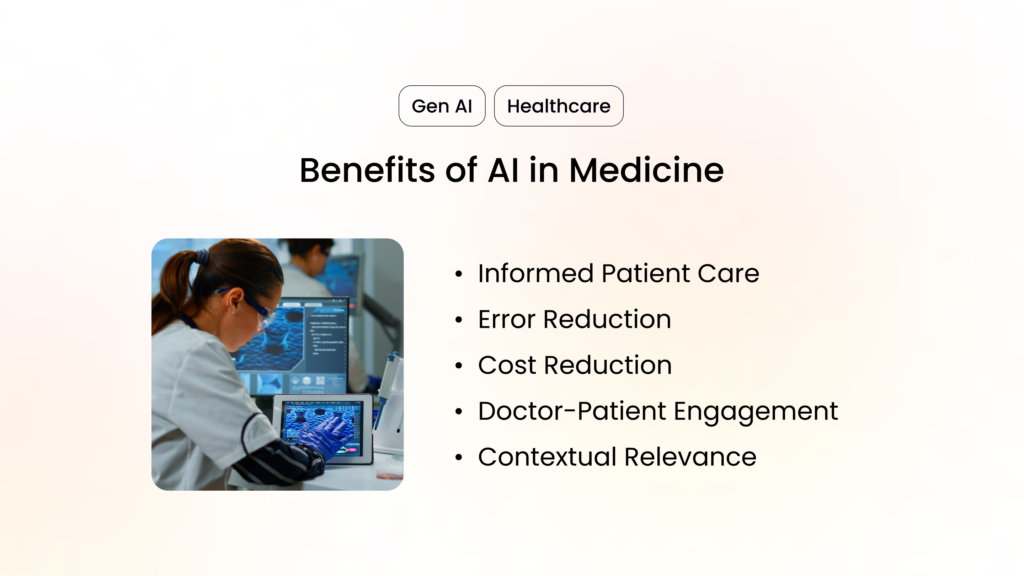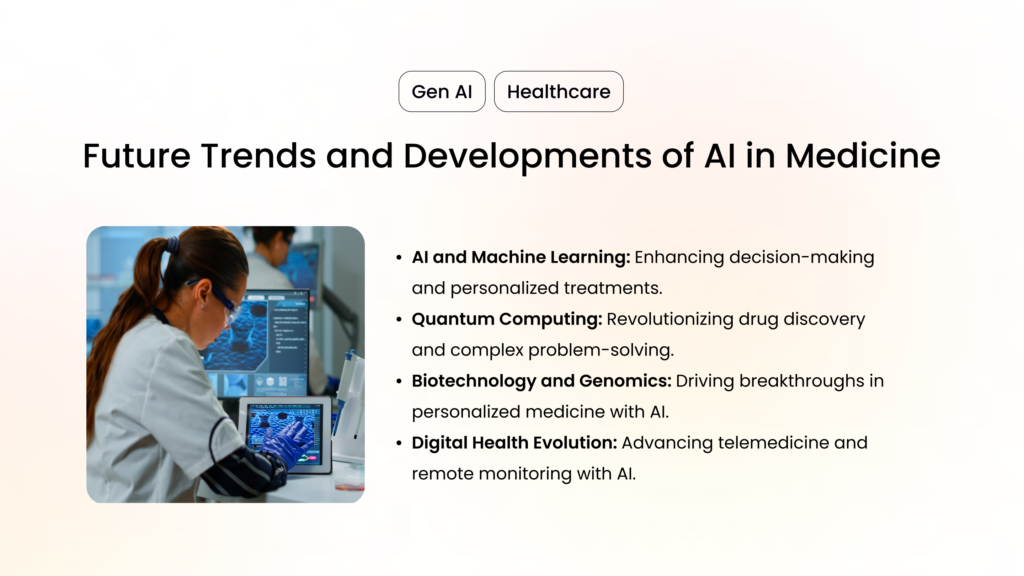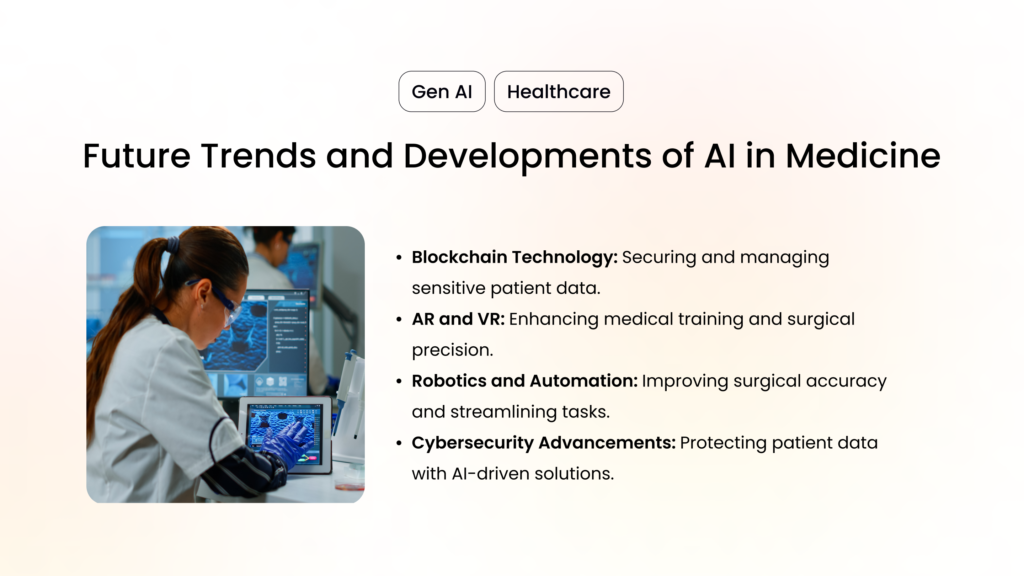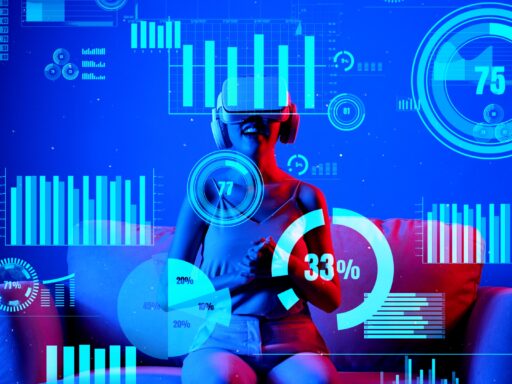The integration of Artificial Intelligence (AI) in medicine is revolutionizing the industry with unprecedented advancements in both clinical practice and medical research. Recent advancements in AI are indispensable tools in modern medicine.
From enhancing clinical decision support to transforming imaging analysis, AI is reshaping how healthcare providers diagnose, treat, and monitor patients. AI’s impact is also most notably seen in clinical decision support systems. This helps healthcare providers make informed decisions on treatments, medication selection, or mental health care by providing immediate access to relevant research and information.
In the realm of medical imaging, AI tools are proving invaluable by analyzing CT scans, x-rays, MRIs, and other images to identify lesions or abnormalities that might be missed by human radiologists.
The COVID-19 pandemic accelerated the adoption of AI technologies. This prompted health systems worldwide to deploy AI in patient monitoring and COVID-19 screening. While research and results from these implementations are still being gathered, the trend towards AI integration in healthcare is undeniable.
As the standards for AI in medicine continue to evolve, the benefits for clinicians, researchers, and patients are becoming increasingly evident. AI in medicine is becoming the cornerstone of the digital health systems.
In this blog, we will explore the transformative potential of AI in healthcare. We then highlight its current applications and the advancements yet to come. Join us as we delve into how AI is reshaping the landscape of medicine and improving patient outcomes worldwide.
AI Applications in Medicine
AI in Disease Detection and Diagnosis
One of the most compelling applications of AI in medicine is its ability to detect and diagnose diseases. Machine learning models can monitor the vital signs of critically ill patients around the clock, alerting healthcare providers if risk factors rise. Unlike standard medical devices, AI can analyze vast amounts of data to identify complex conditions like sepsis. For instance, IBM has developed an AI model that predicts severe sepsis in premature babies with 75% accuracy.
Personalized Disease Treatment
AI facilitates precision medicine by offering personalized, real-time recommendations. Machine learning models can remember patient preferences, providing continuous virtual assistance tailored to individual medical histories, preferences, and needs. This system allows patients to get immediate answers without repeatedly explaining their situation to different healthcare providers.
AI in Medical Imaging
AI is significantly impacting medical imaging by detecting conditions such as breast cancer with accuracy comparable to human radiologists. AI helps clinicians manage the large volume of medical images by identifying crucial historical data and presenting relevant images for review. This not only speeds up diagnosis but also ensures that critical findings are not overlooked.
Clinical Trial Efficiency
AI can streamline clinical trials by speeding up the process of assigning medical codes to patient outcomes and updating datasets. For instance, two IBM Watson Health clients reduced their medical code searches by over 70% using AI, significantly improving efficiency. This accelerates the overall process of clinical trials while maintaining high accuracy and regulatory compliance.
Accelerated Drug Development
AI can make drug discovery faster and less expensive by improving drug design and identifying new drug combinations. By addressing big data challenges in the life sciences, AI holds the potential to transform drug development processes. This could lead to quicker, more cost-effective ways to discover new therapies and bring them to market.
Benefits of AI in Medicine

Informed Patient Care
Integrating AI into clinical workflows can provide valuable context for healthcare providers during care decisions. Machine learning algorithms can reduce research time by offering evidence-based insights about treatments and procedures while the patient is still present. This improves the quality of care and speeds up the decision-making process.
Error Reduction
AI can enhance patient safety by improving error detection and drug management. A systematic review of 53 studies found that AI-powered decision support tools positively impact error detection and management in healthcare. This means fewer mistakes in medication administration and diagnosis, leading to better patient outcomes.
Reducing the Costs of Care
AI has the potential to lower healthcare costs in several ways, including reducing medication errors, providing customized virtual health assistance, preventing fraud, and making administrative and clinical workflows more efficient. These cost savings can be redirected towards improving patient care and investing in new technologies.
Increasing Doctor-Patient Engagement
AI can offer around-the-clock support through chatbots that answer basic questions and provide resources when providers are unavailable. AI can also triage questions and flag important information for review, alerting providers to significant health changes. This ensures that patients receive timely and accurate information, improving their overall experience.
Providing Contextual Relevance
Deep learning allows AI to distinguish between different types of information using context. For example, AI can use natural language processing to differentiate between current medications and newly recommended ones in a clinical note, ensuring accurate medical histories. This contextual relevance is crucial for effective patient care and treatment planning.
Future Trends and Developments of AI in Medicine
As we look towards the future, several key trends and developments in artificial intelligence (AI) are poised to revolutionize the field of medicine. Here are some of the most promising areas:

- Advanced AI and Machine Learning: The continuous advancements in AI and machine learning will further enhance their applications in healthcare. These technologies will become even more integral to decision-making processes, improving diagnostics and enabling highly personalized treatments. AI’s ability to analyze vast amounts of data quickly and accurately will support medical professionals in providing more precise and efficient care.
- Quantum Computing: While still in its early stages, quantum computing has the potential to revolutionize data processing in medicine. This technology could transform drug discovery, allowing researchers to solve complex problems and simulate molecular interactions with unprecedented speed and accuracy. Quantum computing may unlock new possibilities for understanding and treating complex diseases.
- Biotechnology and Genomics: Advances in biotechnology and genomics, combined with AI, will drive significant breakthroughs in personalized medicine. AI algorithms can analyze genetic data to identify individual risk factors and recommend tailored treatments. Technologies like CRISPR will benefit from AI’s ability to predict outcomes and refine gene-editing techniques.
- Digital Health and Telemedicine Evolution: AI will continue to enhance digital health solutions, including telemedicine and remote patient monitoring. The integration of AI with wearables and health apps will provide continuous health monitoring, offering real-time insights and proactive care. Improved interoperability between systems will ensure seamless data exchange and more coordinated care.
- Blockchain Technology: In healthcare, blockchain technology will secure and manage sensitive data. Its decentralized and tamper-resistant nature will improve data integrity and security, ensuring patient information is protected while facilitating efficient data sharing among healthcare providers.
- Augmented Reality (AR) and Virtual Reality (VR): AR and VR technologies will expand their applications in medicine. VR can be used for medical training and therapeutic purposes, while AR can assist surgeons during procedures by providing real-time, context-aware information. These technologies will enhance precision and outcomes in various medical fields.
- Robotics and Automation: AI-driven robotics and automation will continue to impact healthcare. Developments in surgical robots will enhance precision in surgeries, while robotic process automation will streamline administrative tasks, allowing healthcare professionals to focus more on patient care.
- Cybersecurity Advancements: As healthcare becomes increasingly digital, the need for robust cybersecurity measures will grow. AI-driven cybersecurity solutions will be crucial in protecting sensitive patient data, ensuring privacy, and preventing cyber threats.

These future trends and developments in AI are set to transform medicine, making healthcare more efficient, personalized, and secure. As we embrace these technological advancements, the potential to improve patient outcomes and streamline healthcare delivery becomes increasingly tangible.
The Future of AI in Medicine
The COVID-19 pandemic has accelerated the adoption of AI in medicine and in healthcare, prompting many health systems worldwide to test new AI-powered tools. Whether it’s patient monitoring algorithms or screening tools for COVID-19, AI is proving its worth in various medical applications.
Research and results from these tests are still being collected, and the standards for AI use in medicine are still being established. However, the potential for AI to benefit clinicians, researchers, and patients is growing steadily.
It is becoming increasingly clear that AI will be a fundamental component of the digital health systems that underpin modern medicine. The transformative power of AI in medicine is undeniable, and as technology continues to evolve, its applications and benefits will only expand further.
For healthcare professionals, tech enthusiasts, and medical innovators, the time to embrace AI is now. By integrating AI into your practice or research, you can stay ahead of the curve and contribute to a future where healthcare is more efficient, accurate, and personalized.






